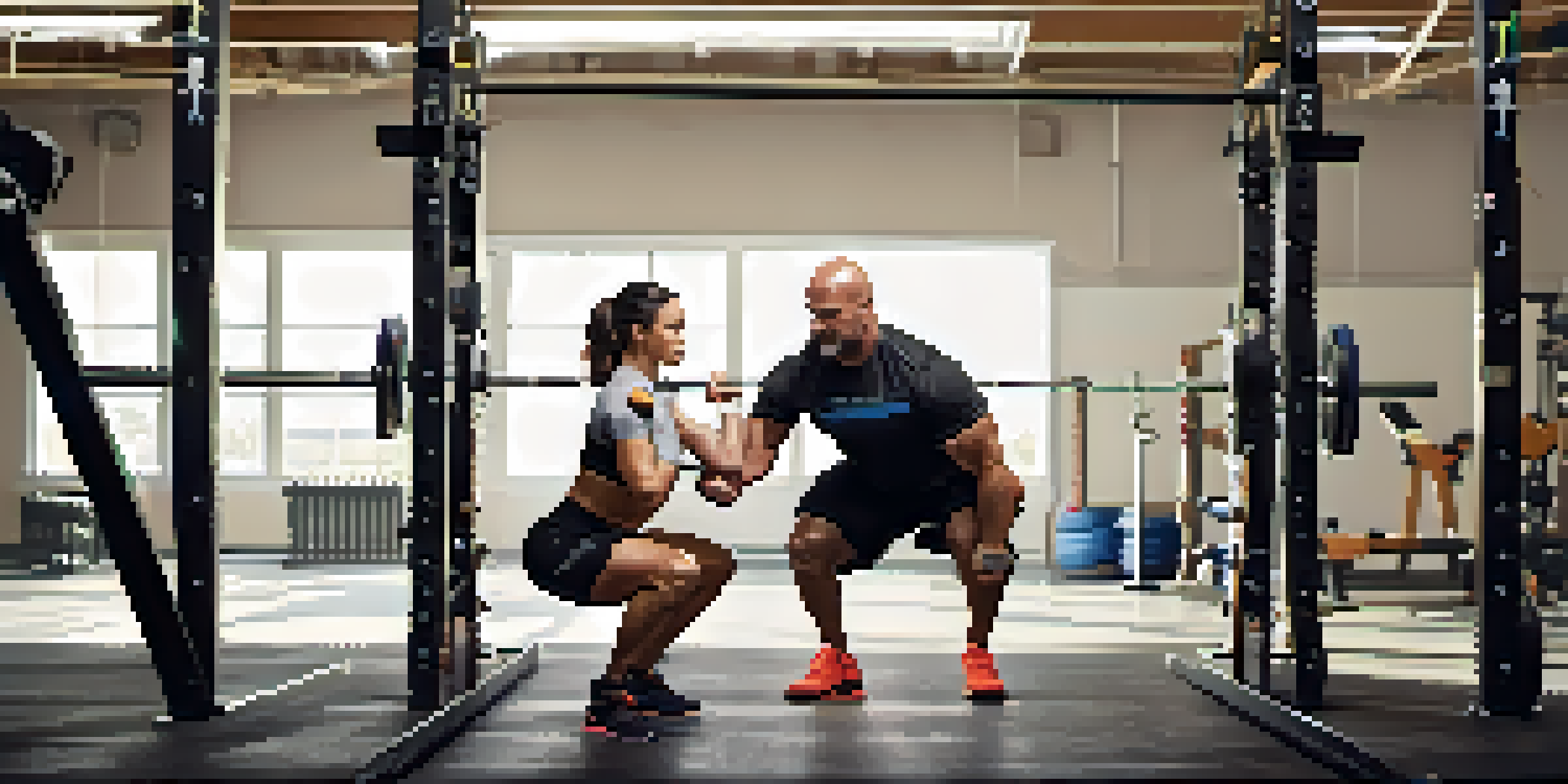Developing Effective Training Plans with a Powerlifting Coach

Understanding the Role of a Powerlifting Coach
A powerlifting coach plays a crucial role in guiding athletes through their training journey. They not only provide expertise in technique but also help in setting realistic goals tailored to individual strengths and weaknesses. Think of them as your personal GPS, navigating you through the twists and turns of your powerlifting experience.
Success usually comes to those who are too busy to be looking for it.
The coach's responsibilities extend beyond just creating a workout plan; they also analyze your performance, making adjustments as necessary to ensure continued progress. This ongoing feedback loop is essential for developing a solid foundation and preventing injuries. In this way, a coach becomes a partner in your fitness journey, committed to your success.
Moreover, a powerlifting coach can offer insights into nutrition, recovery, and mental strategies, which are all vital components of a successful training plan. By addressing all aspects of your performance, they help create a holistic approach that maximizes your lifting potential.
Setting Clear and Achievable Goals
Goal setting is a fundamental part of any training plan, and it’s especially important in powerlifting. Your coach will work with you to define specific, measurable, achievable, relevant, and time-bound (SMART) goals. For instance, instead of saying, 'I want to lift heavier,' you might set a goal to increase your squat by 10 pounds in the next eight weeks.

These clearly defined goals not only provide motivation but also help track progress over time. When you can see how far you’ve come, it boosts your confidence and keeps you committed to the training process. It’s like climbing a mountain; each step up gives you a clearer view of your destination.
Coaches Guide Your Powerlifting Journey
A powerlifting coach provides essential support in technique, goal setting, and overall training strategy to help athletes succeed.
Additionally, having short-term and long-term goals allows for adjustments along the way. If you hit a plateau or face unexpected challenges, your coach can help recalibrate your goals to keep you on track, ensuring that you stay focused and engaged.
Designing a Personalized Training Program
A personalized training program is at the heart of effective powerlifting coaching. Your coach will assess your current fitness level, experience, and any specific needs to create a tailored plan. This individualized approach ensures that each workout is aligned with your unique goals and capabilities.
Strength does not come from physical capacity. It comes from an indomitable will.
For example, if you struggle with bench press technique, your program might include additional accessory exercises that target the muscles involved in that lift. This way, every session is purposeful and contributes directly to your overall success. It’s like having a recipe that perfectly matches your taste preferences.
Moreover, a well-structured program incorporates variation to keep things fresh and prevent boredom. Your coach will rotate exercises, rep schemes, and intensity levels to challenge your body and stimulate progress. This variety not only enhances training performance but also keeps you engaged and excited about your workouts.
Incorporating Technique and Form Drills
Technique is paramount in powerlifting, and your coach will emphasize its importance throughout your training. Proper form not only maximizes your lifting potential but also minimizes the risk of injury. Think of it as building a strong foundation for a house; without it, everything else is at risk.
Your coach will introduce various drills and exercises to help you master the key lifts: squat, bench press, and deadlift. These drills may include lighter weight sessions focused solely on form or specific movements that isolate weaknesses. By dedicating time to these drills, you’ll develop the muscle memory needed to execute lifts flawlessly.
Personalized Training Plans Matter
Customized training programs ensure workouts align with individual strengths and weaknesses, maximizing performance and progress.
Additionally, regular video analysis can provide valuable insights into your form. By reviewing footage of your lifts, your coach can give immediate feedback and suggest tweaks to help you achieve optimal performance. This ongoing refinement is crucial for long-term success in powerlifting.
Balancing Intensity and Recovery
Finding the right balance between intensity and recovery is essential in powerlifting. Your coach will design a program that challenges you while ensuring adequate rest to promote muscle growth and prevent burnout. It’s similar to the concept of work-life balance; too much of either can lead to negative consequences.
Training too intensely without proper recovery can lead to overtraining, which can stall progress and increase the risk of injury. Conversely, too much rest can hinder your ability to build strength. Your coach will monitor your performance and fatigue levels, adjusting workouts as needed to maintain this balance.
Incorporating recovery techniques, such as active rest days, nutrition optimization, and sleep strategies, will also be part of your training plan. By prioritizing recovery, you’ll be better equipped to handle the demands of heavy lifting and ensure longevity in your powerlifting journey.
Using Nutrition to Fuel Performance
Nutrition plays a significant role in powerlifting performance, and your coach will likely guide you in optimizing your diet. Proper fueling helps you not only recover from workouts but also enhances your lifting capacity. It’s like putting the right fuel in a car; without it, you won't go far.
Your coach may work with you to establish a nutrition plan that aligns with your training goals, focusing on macronutrients such as protein, carbohydrates, and fats. For instance, increasing protein intake can support muscle recovery, while carbohydrates provide the energy needed for those tough training sessions.
Nutrition Fuels Lifting Success
A well-structured nutrition plan enhances recovery and performance, making it a key component of effective powerlifting training.
Furthermore, your coach can emphasize the importance of hydration and its impact on performance. Staying well-hydrated ensures that your muscles function optimally and helps prevent fatigue. Together, these nutritional strategies create a solid foundation for achieving your powerlifting goals.
Tracking Progress and Making Adjustments
Tracking your progress is essential for growth in powerlifting, and your coach will help you establish a system for monitoring your lifts and overall performance. This can include keeping a detailed training log or using apps that track your workouts, making it easy to see improvements over time. It’s like having a map that shows you how far you’ve come.
Regular assessments, such as testing your one-rep max or evaluating your lifting form, will also be part of this process. Your coach will analyze these results to identify areas of strength and those needing improvement. This ongoing evaluation ensures that your training remains effective and aligned with your goals.

As you progress, your coach will adapt your training plan to reflect your evolving capabilities. If you achieve a goal sooner than expected, they may increase the intensity or introduce new challenges. This fluidity in your training plan keeps you engaged and maximizes your potential as a powerlifter.